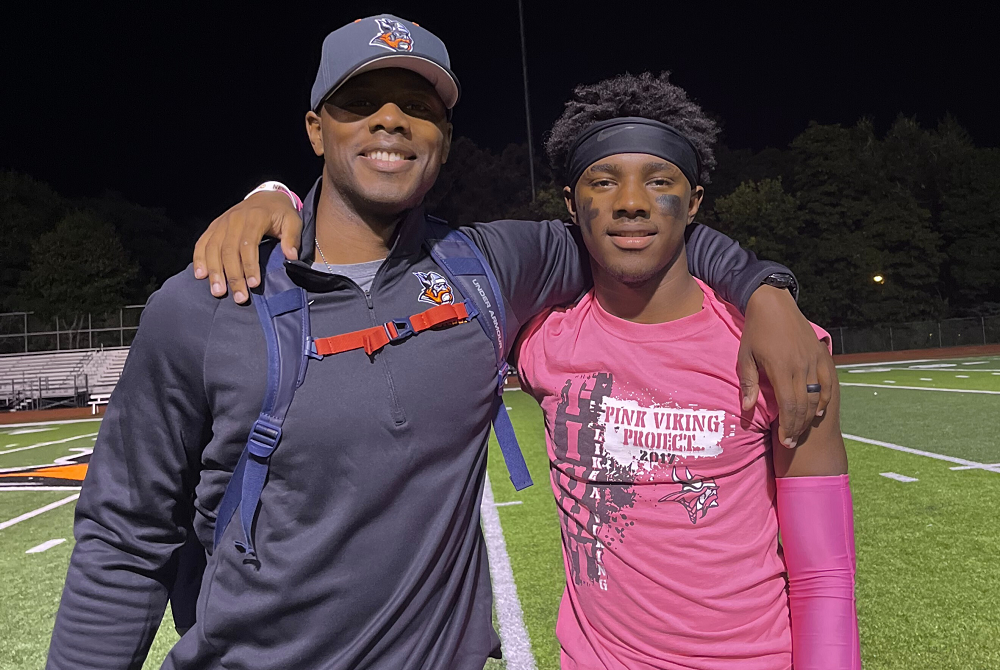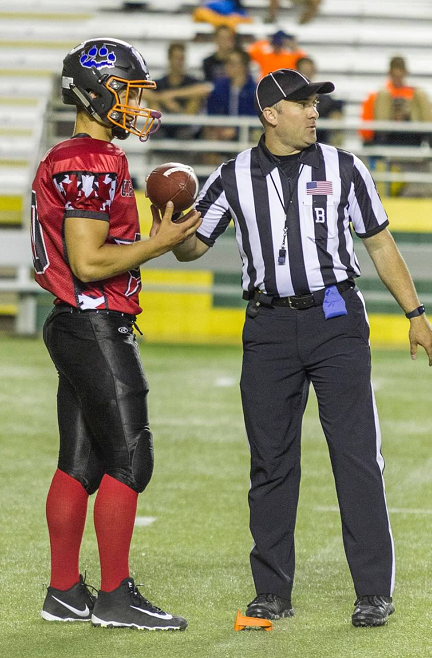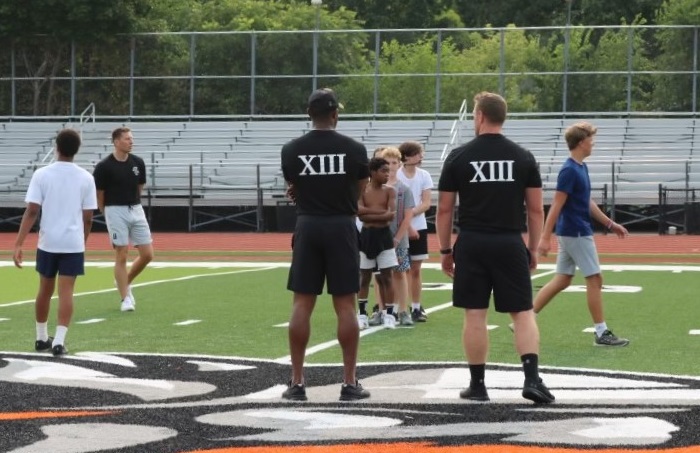
Task Force Building Multi-Sport Message
November 11, 2016
By Geoff Kimmerly
Second Half editor
Walled Lake Western’s Cody White draws his perspective on high school sports from a background that, while perhaps not unique, has to be close.
The Warriors senior is one of the top college football prospects in Michigan, a Big Ten-caliber player who has committed to continue his career at Michigan State University after he graduates in the spring.
Our state has a handful of athletes like that every year, of course. But White also is the son of former NFL player and Detroit Lions executive Sheldon White – and has followed his father’s Dayton, Ohio, footsteps in playing three sports during his high school career.
White plays football, basketball during the winter and baseball in the spring, in addition to travel basketball and baseball during the summer. He has played these same sports throughout high school. His freshman year he also competed in track & field, along with baseball. As of May – when White and his multi-sport experience were featured on Second Half – he hadn’t ruled out returning to track & field, in addition to baseball, as a senior.
“I couldn’t see myself not competing in those sports,” White said at the time. “I love them so much. I want to finish my senior year playing all three.”
It’s White’s experience, and the benefits enjoyed by so many who have shunned the recent trend toward specialization, that is driving the MHSAA’s Multi-Sport Task Force as it aims to promote the value of a varied sports experience through high school, even for athletes considered “elite” in a sport they’ll go on to play at higher levels.
The Multi-Sport Task Force met for the third time Oct. 27 and includes coaches, administrators and teachers with diverse experiences in athletics at schools large and small; urban, suburban and rural and in both the interscholastic and club settings.
The idea of moving away from specialization and back toward playing multiple sports has gained steam in recent years with pronouncements of how doing so paid off for nationally-recognized stars like professional golfer Jordan Spieth, baseball Hall of Famer John Smoltz and a number of members of the U.S. women’s soccer national team who played multiple sports through high school.
The MHSAA’s task force is working to develop that message, package it in the most digestible formats, and deliver it to the key decision-makers to benefit athletes at the age where the message can have the heaviest impact on their sports careers and growth into physically fit adults.
“This is a fundamental topic in school sports,” MHSAA Executive Director Jack Roberts told the task force during its most recent meeting. “This is something we’ll be talking about five and 10 years from now.”
The task force is charged with a series of goals that will be discussed below and are still in development. But there’s no doubt coaches will play a significant part in promoting and carrying out this important mission.
“Growing up was a little different (for me) than the usual kid. Going to Lions games and just being around football all the time. I think I love the game more because I was around it so much. But I think playing three sports helped me, too. The twisting of your hips in baseball, when you swing the bat, you’re using different muscles. And all the jumping you do in basketball. You have to move in tight spaces. With football, you’re with the football guys. By doing all three you meet different people.” – Cody White, “Western’s White Enjoys ‘Special’ Career” – May 4, 2016
What we’ve learned
The task force’s first meeting in April included discussions with Dr. Tony Moreno of Eastern Michigan University, a frequent Coaches Advancement Program instructor, and Dr. Brooke Lemmon of the MSU Sports Medicine Clinic. Among points from their focus on medical issues that result from specialization:
• Specialization has chronic, long-term affects; young people who do not learn physical literacy – how to solve movement problems – are less likely to be physically active and, hence, less likely to be physically fit. This is becoming an expensive health issue for society.
• The loss of physical education from schools is the root of these problems and has led to the creation of “privatized PE” for those who can afford a club sports experience. Physical education in schools, done correctly, can create a relatively noncompetitive environment that increases student interest in becoming physically active.
• More time spent in one activity will lead to more injuries, especially of the chronic nature. The number of hours per week a child spends on one sport activity shouldn’t exceed that child’s age (8 hours per week for an 8-year-old, for example).
Dr. Dan Gould, the director of the MSU Institute for the Study of Youth Sports, talked to the task force during its second meeting about how children perceive sports – and the need to adjust parents’ expectations for their kids’ success. He explained how kids can lose their identity focusing on just one sport, and also the importance of free play – the games kids make up themselves while playing in a structure-free environment.
Bob Mancini of USA Hockey visited with the task force most recently, explaining how his was the first governing body to tell athletes it wanted them to play their sport – but in order to do so well, play other sports also. USA Hockey’s American Development Model was launched in 2009 to in part promote multi-sport participation – and is growing hockey in the process, with increased participation seen at youth levels over the last three years.
“It’s just really fun to do different things. We don’t have a lot of the numbers, but we have the people who are willing to put in the hard work, even if it’s not their best sport. Each season is only three to four months at the most. So it keeps things exciting.”— 2016 Bronson graduate Kelsey Robinson, a defensive specialist in volleyball, former cross country runner, guard in basketball and a third baseman and centerfielder in softball, “Multi-Sport Experience ‘Special’ for Bronson” – February 2, 2016
Questions & Answers
The task force will meet again Feb. 8, and in the meantime there are a number of questions – and answers – to be considered.
The group has pinpointed a series of goals:
1. Partner with groups promoting diverse physical activity.
2. Encourage those promoting more and better physical education.
3. Prepare tools for administrators for use in interviewing prospective coaches, conducting meetings with their coaching staffs and encouraging them to “walk the talk” of balanced participation.
4. Assist in the explanation of the multi-sport experience to parents through a variety of media, including a guidebook and video explaining its benefits.
Carrying out these aspirations comes with plenty to discuss.
Who most needs to hear the message of multi-sport participation? It’s most likely junior high and middle school parents, or even those of elementary students just starting to experience organized athletics.
 What do these parents and children most need to know? Parents are stakeholders in their children’s athletic ventures. The challenge is convincing them our way is best for their kids’ futures, from a health and development standpoint.
What do these parents and children most need to know? Parents are stakeholders in their children’s athletic ventures. The challenge is convincing them our way is best for their kids’ futures, from a health and development standpoint.
Who should deliver this message? Celebrities obviously carry clout when they talk about how their multi-sport experiences led them to become successful adults. But there also could be a strong emotional tug from current student-athletes who tell their stories.
How can coaches and athletic directors help spread the word? The MHSAA, with input from the task force, will develop tools to help. But the options are many: could it come in video form, eye-catching graphics for use at coaches meetings, or live interaction at regional summits?
We are looking for ideas, both for getting out the message and incentivizing taking part in the multi-sport experience. Schools already are doing great things to promote multi-sport participation, and we’d love to hear about what's working.
To that vein, we’ll close with a final success story from this fall about a team that benefited from a lineup of multi-sport athletes:
Grosse Pointe Woods University Liggett on Oct. 15 ended an eight-year championship run by Ann Arbor Greenhills at Lower Peninsula Division 4 Boys Tennis Finals. Knights coach Matt Sobieralski relied on a roster filled with multi-sport athletes, including No. 1 singles player T.J. Dulac, who also ran cross country this fall.
Only one player on the Liggett roster plays only tennis, and Sobieralski says his players’ multi-sport participation served them well.
“It makes you tough, mentally tough and strong. And they’re competitive. That’s important. I think tennis, a lot of times, is 80 percent mental and 20 percent ability. You win a lot of matches with guts and just hanging in there. I always say a good player can win even when they’re not playing their best, because they’ll try something different and they keep fighting. That’s the team I’ve got. I’m really proud of their fight.” – Matt Sobieralski, “Liggett Ends Greenhills’ 8-Year Reign” – October 16, 2016
PHOTOS: (Top) Walled Lake Western's Cody White runs ahead of a group of Lowell defenders during last season's Division 2 Semifinals. (Middle) Bronson (right) goes for a kill during last season's Class C Semifinal against Traverse City St. Francis. (Top photo courtesy of Walled Lake Western athletic department.)

From MSP Post to Postgame: Lieutenants Return to the (Football) Field
September 27, 2023
While fans are settling into another season, Michigan State Police Lt. Tedric Gibbs has been fully immersed in football for months.
The Jackson Post’s assistant post commander serves as assistant coach for Jackson High School’s varsity football team and for the team at Parkside Middle School.
“I started coaching when my older son was in youth sports, as a way to do something together that we both love,” Gibbs said. “My younger son followed the same path, so I joined his team too. I grew up in Jackson and am grateful to be able to serve my hometown from the sidelines and at our post.”
 Some 400 miles north, Lt. Mark Giannunzio is also a familiar face in and on the field. The MSP Negaunee Post assistant post commander and Eighth District public information officer enforces the rules of the game as a high school and college football official, the latter for the Great Lakes Intercollegiate Athletic Conference.
Some 400 miles north, Lt. Mark Giannunzio is also a familiar face in and on the field. The MSP Negaunee Post assistant post commander and Eighth District public information officer enforces the rules of the game as a high school and college football official, the latter for the Great Lakes Intercollegiate Athletic Conference.
“I started at the high school level to stay involved in athletics and make authentic connections in the community,” Giannunzio said. “It’s rewarding to help teach the game and share knowledge of the rules. I currently have a full 11-game schedule in the GLIAC Division II college conference, with high school games interspersed during the year.”
The correlation among coaching, officiating and policing translates.
“With my fellow troopers, I want to inspire, motivate and encourage to get the most out of them,” Gibbs said. “I take the same approach with my players to figure out what they need from me, as their designated leader, to be as successful as they can. In both capacities, I do the work alongside them. We do it together.”
This approach is especially important when tough times surface. Lieutenant Gibbs’ high school team experienced tragedy right before its first game when a player died in a car crash.
“We focused on adversity,” said Gibbs, who was in a unique position to talk from a police perspective too. “It’s a benefit to have that insight and background and share it with what they can control – make good decisions and wear your seatbelt.”
Lieutenant Gibbs incorporates his coworkers when he can, like during spring conditioning when fellow troopers join him and his players, helping all involved to make new connections and build strong bonds between the students and officers.
 “One of the most important attributes in both careers is communication,” Giannunzio said. “Communication can make or break an official and a police officer. Much like selling a citation to a motorist, I need to be able to sell the penalty in a calm and professional manner. Demeanor and attitude go together on both the football field and when we are out patrolling in the Blue Goose.”
“One of the most important attributes in both careers is communication,” Giannunzio said. “Communication can make or break an official and a police officer. Much like selling a citation to a motorist, I need to be able to sell the penalty in a calm and professional manner. Demeanor and attitude go together on both the football field and when we are out patrolling in the Blue Goose.”
Treating everyone with dignity and respect is something Lieutenants Gibbs and Giannunzio commit to as members of a modern police agency and in their areas of expertise on the football field.
“Both roles afford so many opportunities to develop culture and cultivate teamwork,” Gibbs said. “The best part is watching others flourish and playing a part in their growth.”
PHOTOS (Top) Michigan State Police Lt. Tedric Gibbs, left, serves as an assistant football coach for the Jackson High varsity. (Middle) Lt. Mark Giannunzio officiates at the high school and college levels. (Below) Gibbs also coaches at Jackson Parkside Middle School. (Photos provided by the Michigan State Police.)

